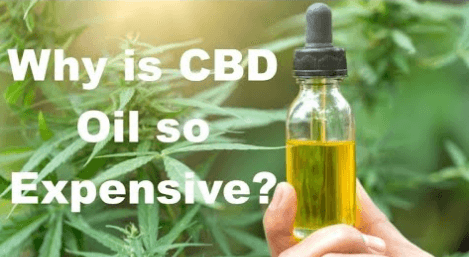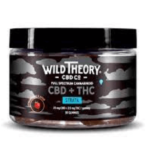CBD oil has gained significant popularity in recent years for its potential health benefits, ranging from pain relief to anxiety reduction. However, one common question that arises is why CBD oil tends to be relatively expensive compared to other products on the market.
In order to understand this phenomenon, it is important to examine various factors that contribute to the high cost of CBD oil production and distribution.
Firstly, the labor-intensive cultivation and extraction process plays a crucial role in driving up the price of CBD oil. The cultivation of high-quality hemp plants requires meticulous attention to detail, including careful monitoring of soil conditions, temperature control, and pest management. Additionally, extracting CBD from hemp involves using specialized equipment and techniques that require skilled labor. These factors contribute to increased production costs which are ultimately passed on to consumers.
Furthermore, quality control and testing standards also contribute to the higher price tag of CBD oil. In order for CBD products to be safe and effective for consumption, rigorous testing procedures need to be followed at every stage of production. This includes testing for cannabinoid content, potency levels, contaminants such as pesticides or heavy metals, and ensuring compliance with regulatory standards. These extensive quality control measures add additional costs that are reflected in the final price of CBD oil.
In conclusion, several factors contribute to why CBD oil tends to be more expensive compared to other products on the market. Labor-intensive cultivation and extraction processes along with stringent quality control standards increase production costs significantly. Additionally, limited supply due to legal restrictions and high demand further drives up prices. Understanding these reasons can help consumers make informed decisions about their purchases while appreciating the value that goes into producing high-quality CBD oil.
Labor-Intensive Cultivation and Extraction Process
Labor-intensive cultivation and extraction processes contribute to the high cost of CBD oil. The production of CBD oil involves several labor-intensive steps, from cultivating hemp plants to extracting the cannabinoids.
Growing hemp requires careful monitoring and regular maintenance to ensure optimal growth conditions. This includes tasks such as planting seeds, watering, fertilizing, and protecting the plants from pests and diseases. Additionally, harvesting hemp plants at the right time is crucial to maximize cannabinoid content.
After harvesting, the extraction process begins, which involves separating the valuable cannabinoids from the plant material. This process can be complex and time-consuming, requiring specialized equipment and skilled technicians.
Moreover, industry regulations play a significant role in increasing costs. CBD oil manufacturers are required to comply with strict quality standards set by regulatory bodies to ensure consumer safety. These regulations often necessitate additional testing procedures and quality control measures that add to the overall cost of production.
Therefore, due to these labor-intensive cultivation and extraction processes as well as industry regulations, CBD oil comes with a higher price tag than other types of oils or supplements on the market today.
Quality Control and Testing Standards
Rigorous adherence to standardized quality control measures and testing procedures ensures that only products meeting the highest industry standards are made available to consumers, exemplifying how meticulous attention to detail is akin to the careful craftsmanship of a Swiss watchmaker.
This commitment to quality control comes with cost implications for CBD oil manufacturers. Firstly, extensive testing protocols require sophisticated laboratory equipment and highly skilled technicians, both of which contribute to increased production costs.
Secondly, maintaining compliance with strict industry standards necessitates thorough documentation and record-keeping processes, adding administrative expenses.
Lastly, regular third-party testing further adds to the overall cost of CBD oil production but guarantees transparency and credibility in an industry where mislabeled or adulterated products can be prevalent.
Nevertheless, these investments in quality control are essential for ensuring consumer safety and satisfaction while also enhancing trust within the market.
Limited Supply and High Demand
Limited supply and high demand are two key factors contributing to the expensive price of CBD oil.
One reason for limited supply is the legal restrictions and regulations surrounding the production and sale of CBD products. These restrictions vary from country to country and can lead to a scarcity of quality CBD oil.
Additionally, the increasing popularity and consumer demand for CBD oil have also contributed to its high price, as companies capitalize on this trend by charging premium prices for their products.
Legal Restrictions and Regulations
One factor contributing to the high cost of CBD oil is the extensive legal restrictions and regulations surrounding its production and distribution. These government regulations impose a significant burden on manufacturers, leading to increased production costs that are ultimately passed on to consumers.
Firstly, obtaining the necessary licenses and permits can be time-consuming and costly for producers. They must comply with strict quality control standards, testing requirements, and labeling regulations set by regulatory bodies such as the Food and Drug Administration (FDA).
Secondly, there are limitations on where hemp plants can be grown legally, restricting the supply of raw materials. This creates an additional challenge for manufacturers who may have to source hemp from specific regions or countries, adding transportation costs and potential import/export fees.
Lastly, since CBD oil falls into a regulatory gray area in some jurisdictions, companies may face legal risks if they do not adhere strictly to these rules. To mitigate this risk, manufacturers invest in legal counsel and compliance measures which further contribute to the overall expense of producing CBD oil.
Increasing Popularity and Consumer Demand
Gaining momentum akin to a snowball rolling down a mountain, the surging popularity and consumer demand for CBD oil have contributed significantly to its high cost.
As more people become aware of the potential health benefits associated with CBD oil, such as pain relief and anxiety reduction, the demand for this product has skyrocketed. This increased medical benefit has led to a surge in consumer interest and willingness to pay a premium price for CBD oil.
Additionally, consumers are drawn to CBD oil due to its natural origins and potential as an alternative treatment option. However, it is important to note that while CBD oil has shown promise in certain areas, there are still potential health risks that need further research and understanding.
The lack of regulation and standardization in the industry also adds to the cost of CBD oil as companies invest in quality control measures.
Overall, the increasing popularity and consumer demand for CBD oil have played a significant role in driving up its price.
Research and Development Costs
Research and development costs play a significant role in the high price of CBD oil.
The lack of innovation in the CBD industry contributes to higher research and development costs, as companies invest heavily in exploring new extraction methods, improving product quality, and conducting clinical trials to support the claims associated with CBD oil.
Additionally, production costs are also influenced by the complexity of extracting CBD from hemp plants and ensuring its purity.
The process involves sophisticated equipment, skilled labor, and stringent quality control measures to meet regulatory standards.
These factors contribute to increased expenses during the research and development phase, which ultimately impact the overall price of CBD oil on the market.
Packaging and Marketing Expenses
Packaging and marketing expenses significantly contribute to the overall cost of CBD oil due to the necessity for attractive and informative packaging designs, strategic advertising campaigns, and compliance with labeling regulations.
Sustainable packaging options are often preferred in the CBD industry, which can be more expensive than traditional packaging materials. Companies invest in high-quality packaging to ensure product integrity, prevent leakage or breakage, and maintain the freshness of CBD oil.
Additionally, effective marketing strategies are essential to create brand awareness and attract customers in a competitive market. This includes creating engaging content for websites and social media platforms, sponsoring events or influencers, and implementing targeted advertising campaigns.
Furthermore, complying with labeling regulations is crucial to provide consumers with accurate information about the product’s ingredients, dosage instructions, and potential side effects. These factors contribute to the higher cost of CBD oil but play a vital role in building trust among consumers and establishing a strong brand presence in the market.
Distribution and Retail Markup
Distribution and retail markup significantly contribute to the overall cost of CBD oil as it moves from manufacturers to consumers, with various intermediaries along the supply chain adding their margins for storage, transportation, and retailing services.
The distribution challenges faced by CBD oil include ensuring proper storage conditions, maintaining product quality during transportation, and navigating complex regulations. These challenges often require specialized infrastructure and expertise, which can drive up costs.
Additionally, retailers also add their own markup to cover expenses such as rent, staff wages, marketing efforts, and profit margins. This further increases the price of CBD oil for consumers.
Therefore, distribution and retail markup are important factors in understanding why CBD oil is expensive.
Legal and Regulatory Compliance
Compliance with FDA and state regulations is an essential aspect of the CBD oil industry, contributing to its overall cost.
Manufacturers and sellers must adhere to strict guidelines set by the FDA and individual states to ensure product safety, quality, and labeling accuracy.
These regulations require extensive testing, documentation, and certification processes that incur additional expenses for businesses in terms of resources, time, and expertise.
Compliance with FDA and State Regulations
Ensuring adherence to FDA and state regulations requires navigating a complex web of legal requirements, an intricate dance that CBD oil manufacturers must carefully choreograph to avoid potential pitfalls.
The following list outlines the key challenges faced by CBD oil manufacturers in complying with FDA and state regulations:
- Evolving FDA Regulations: The FDA has not yet established clear guidelines for the use of CBD oil as a dietary supplement or food additive. This lack of clarity creates uncertainty for manufacturers, who must rely on their interpretation of existing regulations and stay updated on any new developments.
- State-Level Variations: In addition to federal regulations, CBD oil manufacturers must also comply with individual state regulations, which can vary significantly. Each state may have its own rules regarding labeling, testing, and licensing requirements for CBD products.
- Lab Testing and Product Quality: CBD oil manufacturers are required to conduct thorough lab testing to ensure product quality and safety. This includes testing for potency, contaminants, and other parameters set by regulatory bodies. Meeting these standards adds an additional layer of complexity and cost to the manufacturing process.
Navigating these regulatory challenges is crucial for CBD oil manufacturers to establish trust with consumers and maintain compliance with legal requirements. By staying informed about evolving FDA regulations, understanding state-level variations, and investing in rigorous lab testing procedures, manufacturers can demonstrate their commitment to producing high-quality CBD products that meet regulatory standards.
Read also: Natural power of Hemplucid CBD Oil
Licensing and Certification Expenses
One significant aspect to consider when discussing licensing and certification expenses in the CBD industry is the financial burden placed on manufacturers due to the need for extensive testing and quality control measures.
In order to comply with FDA and state regulations, CBD manufacturers are required to obtain licenses and certifications that ensure their products meet specific standards of safety, potency, and quality. These licenses often come with significant costs associated with application fees, annual renewals, and ongoing inspections.
Additionally, manufacturers must invest in laboratory testing services to verify the consistency and accuracy of their products. These testing procedures can be time-consuming and expensive, further adding to the overall licensing costs.
Furthermore, certification fees are also a key expense as many organizations offer third-party certification programs that provide consumers with assurance regarding product quality. Achieving these certifications requires compliance with strict guidelines set by these organizations, which often involve additional fees for audits and assessments.
The combination of licensing costs and certification fees creates a substantial financial burden for CBD manufacturers, contributing to the higher price points seen in CBD oil products.
Insurance and Liability Coverage
This paragraph will discuss the subtopic of Insurance and Liability Coverage in relation to CBD oil.
Product Liability Insurance is an important aspect for businesses in the CBD industry, as it provides coverage for any potential harm caused by their products.
Legal consultation is essential for companies operating in this sector to ensure compliance with regulations and minimize legal risks.
Risk mitigation strategies are crucial for CBD businesses to protect against potential product liability claims and maintain a strong reputation within the market.
Product Liability Insurance
Product liability insurance is a necessary expense for CBD oil manufacturers, as it provides financial protection in the event of lawsuits related to product defects or injuries caused by their products.
With the increasing popularity and demand for CBD oil, manufacturers face potential risks associated with product quality and safety.
In the event of product recalls or legal liabilities arising from adverse effects or injuries caused by their products, manufacturers can rely on product liability insurance to cover legal costs, settlements, and damages awarded to plaintiffs.
This type of insurance not only safeguards businesses from financial ruin but also assures consumers that they are protected in case of any harm resulting from using CBD oil products.
By having product liability insurance in place, CBD oil manufacturers demonstrate their commitment to quality control and consumer safety, which ultimately helps build trust and credibility within the industry.
Legal Consultation and Risk Mitigation
Legal consultation and risk mitigation are crucial strategies for CBD oil manufacturers to ensure compliance with regulations and minimize potential liabilities associated with their products.
As the CBD industry is still relatively new and constantly evolving, there are various legal risks that manufacturers need to consider. These risks may include regulatory non-compliance, product mislabeling, false advertising claims, or even lawsuits related to adverse health effects.
By seeking legal consultation from experts in the field, manufacturers can stay informed about the ever-changing regulations surrounding CBD products and ensure that their manufacturing processes and marketing practices align with these requirements.
Additionally, implementing effective risk management strategies can help identify potential hazards or vulnerabilities within the production process and supply chain, allowing manufacturers to proactively address them before they escalate into costly legal issues.
This may involve thorough quality control measures, third-party testing of raw materials and finished products, maintaining accurate records of ingredients used in production, and ensuring proper labeling and packaging of CBD oil products.
By taking these proactive steps through legal consultation and risk mitigation efforts, CBD oil manufacturers can protect themselves from legal entanglements while promoting a safer marketplace for consumers.
International Sourcing and Importation
This discussion focuses on the international sourcing and importation of hemp, with a particular emphasis on two key points: hemp sourcing from different countries and customs and tariffs.
When it comes to hemp sourcing, various countries play a significant role in supplying the global market with this versatile plant. Understanding the differences in cultivation practices, quality standards, and regulations across these countries is essential for businesses involved in importing hemp products.
Additionally, customs procedures and tariffs can significantly impact the cost and efficiency of importing hemp products across borders, making it crucial to navigate these processes effectively for successful international trade.
Hemp Sourcing from Different Countries
Hemp sourcing from various countries significantly impacts the cost of CBD oil, as the quality and cultivation methods employed in different regions can vary greatly.
The use of organic farming practices is a key factor in determining the quality of hemp and subsequently the CBD oil derived from it. Countries like Canada and Switzerland have strict regulations on hemp farming practices, ensuring that the plants are grown without the use of pesticides or synthetic fertilizers. These organic certifications not only guarantee a safer and higher-quality product but also increase production costs.
Additionally, some countries have favorable climates for hemp cultivation, resulting in higher yields and lower production costs. For example, countries with long growing seasons and ample sunlight provide ideal conditions for hemp growth, leading to larger harvests and potentially lower prices. Conversely, regions with less favorable climates may require more resources to cultivate hemp successfully, driving up production costs.
By considering these factors and comparing them across different countries, it becomes evident that variations in hemp sourcing contribute significantly to the pricing disparities observed in CBD oil products on the market today.
Customs and Tariffs
Moving on from the discussion of hemp sourcing, another factor that contributes to the high cost of CBD oil is customs and tariffs.
When importing CBD oil from different countries, companies often have to navigate through complex trade agreements and deal with tariff exemptions. These processes can be time-consuming and costly, as companies may need to pay additional fees or taxes for importing CBD oil into their respective countries.
Moreover, the varying regulations surrounding CBD in different countries further complicate the importation process, leading to increased costs. To ensure compliance with these regulations and avoid potential legal issues, companies may need to invest in legal counsel or engage in extensive paperwork, adding to the overall expense of producing CBD oil.
Therefore, customs duties and tariffs play a substantial role in driving up the price of CBD oil due to the complexities involved in international trade agreements and regulatory compliance.
Taxes and Duties
Taxes and duties imposed on CBD oil contribute significantly to its expensive price, burdening consumers with additional costs that elevate the overall market value. The high cost of CBD oil can be attributed to various factors, including tax incentives and import/export regulations.
Governments often impose taxes and duties on imported goods, including CBD oil, as a means of generating revenue for the country. These taxes are typically calculated based on the value or weight of the product, adding a significant financial burden to importers and ultimately increasing the price for consumers.
Additionally, import/export regulations can also impact the cost of CBD oil. Governments may impose strict regulations on importing or exporting certain products, including CBD oil, which can result in additional fees or requirements that drive up costs. These regulations aim to ensure safety standards and compliance with local laws but can add complexity and expenses to the importation process.
Overall, taxes and duties, along with import/export regulations, play a significant role in making CBD oil an expensive commodity for consumers.
Research and Education Initiatives
This discussion will focus on the research and education initiatives related to CBD oil.
One important aspect is funding scientific studies and clinical trials to gather evidence on the efficacy and safety of CBD oil in various medical conditions. These studies help in expanding our knowledge about the potential benefits and risks associated with CBD oil use.
Another key point is educating consumers and healthcare professionals about CBD oil, its effects, proper usage, and possible interactions with other medications. This knowledge dissemination plays a crucial role in promoting informed decision-making and ensuring the responsible use of CBD oil for therapeutic purposes.
Funding Scientific Studies and Clinical Trials
Conducting scientific studies and clinical trials to evaluate the therapeutic potential of CBD oil requires substantial financial resources, with an estimated average cost of $2.6 million per trial.
The high cost can be attributed to various factors, including funding limitations and research ethics.
In order to ensure the integrity and validity of the studies, rigorous protocols need to be followed, which often involve recruiting a large number of participants, conducting extensive laboratory tests, and employing specialized equipment.
Additionally, ethical considerations necessitate thorough informed consent procedures and compliance with regulatory guidelines.
These requirements contribute to the overall expense of these endeavors.
Furthermore, limited funding sources for CBD oil research further exacerbate the issue of high costs.
Many traditional funding agencies may view CBD oil as a controversial or niche topic, leading to fewer grants available for researchers in this field.
Consequently, researchers often have to rely on private investment or industry partnerships to fund their studies.
Overall, the expensive nature of conducting scientific studies and clinical trials on CBD oil is a result of both inherent research complexities and funding limitations in this area.
Educating Consumers and Healthcare Professionals
The previous subtopic discussed the importance of funding scientific studies and clinical trials to validate the efficacy and safety of CBD oil. Building on this, another crucial aspect that contributes to the high cost of CBD oil is consumer education and engagement with healthcare professionals.
As CBD oil continues to gain popularity, there is a growing need for accurate information about its use, dosage, potential side effects, and interactions with other medications. Educating consumers about these aspects can help them make informed decisions regarding the purchase and usage of CBD oil.
Additionally, healthcare professionals play a vital role in guiding patients towards appropriate CBD products based on their individual needs and medical conditions. However, due to limited research in this field, many healthcare professionals may not have sufficient knowledge or training regarding CBD oil.
Therefore, efforts are required to educate both consumers and healthcare professionals through evidence-based resources, workshops, conferences, and educational campaigns. These initiatives will not only enhance consumer awareness but also facilitate meaningful conversations between patients and healthcare providers regarding the use of CBD oil as part of their treatment plan.
Sustainability and Environmental Considerations
Sustainability and environmental considerations play a crucial role in determining the pricing of CBD oil, stirring a sense of responsibility and concern among consumers for the long-term ecological impact.
The cultivation of hemp, from which CBD is derived, can have significant environmental consequences if not managed sustainably. Sustainable farming practices such as organic cultivation methods, crop rotation, and natural pest control can help minimize the use of harmful pesticides and chemicals that can harm both the environment and human health.
Additionally, eco-friendly practices like water conservation techniques and energy-efficient processing methods also contribute to the overall sustainability of CBD production.
By prioritizing these sustainable and environmentally friendly approaches, CBD oil producers ensure that their products are not only safe for human consumption but also aligned with consumer values regarding ecological responsibility.
Quality Assurance and Compliance Testing
Quality assurance and compliance testing ensures that CBD products meet strict standards for purity, potency, and safety, providing consumers with peace of mind and trust in the product they are purchasing.
Compliance testing standards are essential to ensure that CBD oil is free from contaminants such as heavy metals, pesticides, and residual solvents. This testing process involves analyzing samples of the product to determine its chemical composition and identifying any potential impurities.
Quality control and testing standards also play a crucial role in ensuring consistency in the manufacturing process and verifying that the product contains the stated amount of CBD.
These rigorous quality assurance measures help build consumer confidence by demonstrating that CBD oil manufacturers prioritize safety, efficacy, and transparency. As a result, consumers can make informed decisions about their purchases while enjoying the benefits of pure and reliable CBD products.
Payment Processing and Financial Services
Payment processing and financial services in the CBD industry act as the financial backbone, seamlessly facilitating transactions and ensuring a smooth flow of funds, akin to the circulatory system that sustains a thriving ecosystem. The CBD industry faces unique challenges when it comes to payment processing and financial services due to the complex legal landscape surrounding CBD products.
Traditional banks are often hesitant to work with CBD businesses because of regulatory uncertainties and reputational risks associated with the industry. As a result, many CBD businesses have turned to alternative payment methods and financial technology solutions. These innovative approaches offer a way for companies to accept payments without relying on traditional banking systems.
By utilizing cryptocurrency, e-wallets, prepaid cards, or other non-traditional forms of payment, CBD businesses can overcome some of the obstacles they face in securing reliable payment processing services. However, these alternative methods often come with higher fees and stricter compliance requirements compared to traditional banking options.
Despite these challenges, the use of financial technology and alternative payment methods has helped sustain the growth of the CBD industry by providing businesses with access to essential financial services necessary for their operations.
Consumer Perceptions and Market Trends
As we delve deeper into the factors contributing to the high cost of CBD oil, it is essential to consider consumer attitudes and market trends.
The perception of CBD products has changed significantly in recent years, with an increasing number of consumers recognizing the potential health benefits associated with their use.
This shift in perception has created a surge in demand for CBD oil, which, coupled with limited supply, has contributed to its high price point.
Furthermore, pricing strategies employed by companies operating within this industry also play a crucial role in determining the cost of CBD oil.
Companies often incur significant expenses during cultivation, extraction, testing, packaging, marketing, and distribution processes.
To cover these costs while maintaining profitability, businesses may set higher prices for their products.
Additionally, as consumers become more educated about CBD oil and its potential benefits, they are willing to pay a premium for high-quality products that meet their expectations.
Thus, consumer perceptions and market trends contribute significantly to the expensive nature of CBD oil.
Frequently Asked Questions
Does the cost of CBD oil vary depending on the strain of cannabis used?
The cost of CBD oil can vary depending on factors such as the strain of cannabis used and the cultivation methods employed. Different strains may have different yields and cannabinoid profiles, while cultivation methods can influence overall production costs.
How do quality control and testing standards impact the price of CBD oil?
The impact of quality control and testing standards on the price of CBD oil can be likened to the meticulous craftsmanship of a master artist. Rigorous quality control measures ensure purity, potency, and safety, while adherence to testing standards guarantees consistency and reliability.
Are there any regulations or certifications that CBD oil producers need to comply with?
CBD oil producers need to comply with various regulations and certifications. These include adhering to quality control standards, obtaining proper licenses, following labeling requirements, and ensuring that their products meet the legal limits of THC content.
How does the limited supply of CBD oil affect its price?
The limited supply of CBD oil affects its price due to the principles of supply and demand. As market demand increases, the limited supply leads to a higher price for CBD oil, making it more expensive.
What factors contribute to the high demand for CBD oil in the market?
The high demand for CBD oil in the market can be attributed to its ability to meet quality standards and cater to consumer preferences. Its popularity is akin to a rising tide that cannot be ignored.
Conclusion
In conclusion, CBD oil is expensive due to a combination of factors. The labor-intensive cultivation and extraction process, along with the stringent quality control and testing standards, contribute to the high production costs. Additionally, the limited supply and high demand for CBD oil further drive up its price in the market.
Furthermore, research and development costs play a significant role in determining the price of CBD oil. The extensive scientific studies conducted to understand its potential benefits and ensure its safety require substantial financial investment. Moreover, packaging and marketing expenses add to the overall cost of CBD oil.
It is interesting to note that according to market research firm Brightfield Group, the global CBD market is projected to reach $22 billion by 2022. This statistic highlights the immense growth potential of this industry and explains why companies are willing to invest heavily in producing high-quality CBD products.
Overall, while the high cost of CBD oil may be deterrent for some consumers, it can be attributed to various factors such as labor-intensive processes, limited supply and high demand dynamics, research investments, packaging expenses, among others.
As more research is conducted on the efficacy of CBD oil for various health conditions and consumer awareness continues to grow, it is likely that prices will gradually decrease due to economies of scale and increased competition in the market.





 Benefits of Wild Theory CBD
Benefits of Wild Theory CBD